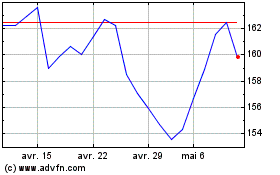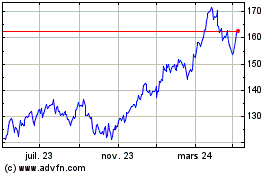Airbus Backs Upgrades to Planes Despite Boeing's 737 MAX Troubles -- Update
21 Mai 2019 - 3:51PM
Dow Jones News
By Robert Wall
Airbus SE's new chief operating officer Tuesday said the
European plane maker expects more regulatory scrutiny after two
crashes by Boeing Co.'s 737 MAX jets have raised questions about
safety oversight.
Regulators "will become stricter," Michael Schoellhorn said. He
added that oversight of Airbus wasn't lax, but "could there be an
effect that they double or triple check even more? Could be." What
the fallout might be is still unclear, he added.
A MAX flight-control feature has been implicated in aircraft
crashes in Indonesia last year and in Ethiopia in March, leading to
the fleet's global grounding. The incidents also have spurred a
review of the regulatory oversight of Boeing by the Federal
Aviation Administration. U.S. lawmakers and the FAA itself are
probing whether the MAX received adequate safety scrutiny. Some
lawmakers are questioning an FAA policy to delegate some safety
judgments on the plane to Boeing under established procedures.
Mr. Schoellhorn said any changes made in the U.S.
safety-oversight process also could have ripple effects in
Europe.
Also under scrutiny in the U.S. and elsewhere is the policy that
allowed the MAX to win safety approvals without undergoing a full
new-aircraft review process. The MAX has roots in a 1960s plane
design that has been repeatedly updated. The safety approvals since
the program first won regulatory backing largely has focused on
only the features that have incrementally changed.
Boeing and the FAA have defended the MAX's approval process.
Airbus Tuesday supported the idea of upgrading older-model
planes for efficiency -- instead of always pursuing brand-new
designs. The European aerospace giant played down the idea that the
latest version of its rival's planes was flawed because it was
another upgrade. "The MAX is not one stretch too many," Chief
Commercial Officer Christian Scherer said.
Airbus has made upgrading existing planes a core part of its
product strategy, too, modernizing its narrowbodies and A330
wide-bodies with new engines. It now is working on an upgrade of
its A321LR, which itself was an upgrade of an earlier version of
its largest narrow body. Mr. Scherer said upgrading planes still
makes sense in cases where incremental improvements don't warrant a
brand new design. The A321 could be further upgraded even beyond
the so called A321XLR now in the concept sage, he added.
Mr. Scherer reiterated Airbus's position that the MAX grounding
hasn't been a benefit for the European plane maker. He also
expressed concern the MAX crisis could dent public confidence in
the safety of commercial air transport more broadly, echoing the
CEO of Airbus.
Airbus officials also worry that the MAX situation could create
lasting fissures between aviation safety regulators in the U.S. and
abroad, hindering the approval of new planes.
The FAA, the principal safety regulator for Boeing planes, this
week plans to host some of its foreign counterparts to discuss its
plan to evaluate the MAX before it is cleared to fly again. Boeing
has been working on a fix to a flight control system flaw
implicated in the two accidents.
Europe's air safety regulator has said it would work with the
FAA, but is also undertaking an independent review of the MAX.
Airbus also said it has devised upgrades for the A220
single-aisle plane it acquired from Canada's Bombardier Inc. The
change will allow the plane to carry 2.3 metric tons more weight,
which translates into more fuel and an additional range of around
450 nautical miles. That capability should be available from the
second half of 2020, Airbus said.
Mr. Scherer also played down concerns that low order bookings at
Airbus and Boeing so far this year suggested demand for new planes
was slumping. "It is only natural that you see ups and downs," he
said. "I do not believe we are at the end of a cycle."
Write to Robert Wall at robert.wall@wsj.com
(END) Dow Jones Newswires
May 21, 2019 09:36 ET (13:36 GMT)
Copyright (c) 2019 Dow Jones & Company, Inc.
Airbus (EU:AIR)
Graphique Historique de l'Action
De Mar 2024 à Avr 2024

Airbus (EU:AIR)
Graphique Historique de l'Action
De Avr 2023 à Avr 2024
